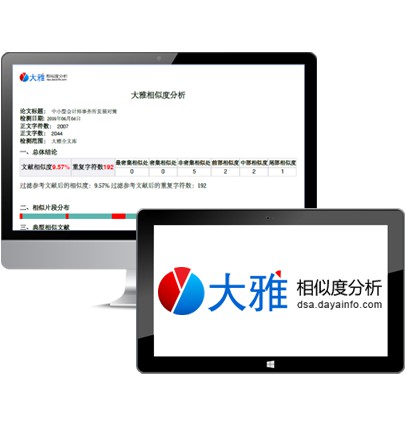
大雅查重入口详细介绍
大雅查重是一个专业的查重系统,它可以检索海量的中国学术文献,包括中文期刊、中文核心期刊、中文会议论文、中文博士论文、专著等。大雅查重的检索速度比传统的查重方法快得多,搜索结果更加准确,可以帮助用户及时发现文献之间的重复,提高文献写... 详细
| 支持语言语种 | 检测需要多久 |
|---|---|
| 中文与英文等小语种 | 平均5分钟左右。 |
| 数据库优势 | 查重报告 |
| 中外期刊数据库、学术会议论文库、硕博学位论文库、特色自建论文库、互联网数据资源大学论文、研究生论文、硕博论文、期刊论文。 | 检测报告指标详细,提供原创率、抄袭率、引用率、字数统计、参考文献字数统计等数据,给用户最直观的展现。 |
大雅论文对比有什么优点

大雅查重是一款专业的文献查重软件,它可以帮助用户发现论文、论著、报告、文章等文献中的重复内容。它支持多种文献格式,可以查询全球最大的文献数据库,以帮助用户检查文献内容的可靠性。通过大雅查重,用户可以快速、准确地查找文献中的重复内容,发现文献中的抄袭或异常部分,从而保护自己的研究成果不被抄袭。大雅查重支持两种查重模式:全文查重和细节查重,其中全文查重可以检查文献中的重复内容,而细节查重则可以检查文献中的句子和单词重复情况,可以更准确地查找抄袭内容。
1.准确率高
 大雅查重系统采用精准的技术算法,查重准确度高,可以发现抄袭、查重率超过50%的文章。
大雅查重系统采用精准的技术算法,查重准确度高,可以发现抄袭、查重率超过50%的文章。
2.安全性高
 大雅查重系统采用多种加密手段,可以有效保护用户的隐私,保证用户的信息安全,同时采用双重认证机制,可以有效防止系统被恶意攻击。
大雅查重系统采用多种加密手段,可以有效保护用户的隐私,保证用户的信息安全,同时采用双重认证机制,可以有效防止系统被恶意攻击。
3.使用方便
 大雅查重的使用方便,用户只需要上传文献,即可快速检测出文献的查重率和抄袭情况。
大雅查重的使用方便,用户只需要上传文献,即可快速检测出文献的查重率和抄袭情况。
4.大雅技术先进
 大雅查重系统采用先进的分布式技术和大数据分析技术,可以快速准确地检测出文献之间的相似性,保证查重质量。
大雅查重系统采用先进的分布式技术和大数据分析技术,可以快速准确地检测出文献之间的相似性,保证查重质量。
大雅如何在线查重
| 1、进入点击查重按钮,查重系统,点击【立即检测】。 | 2、复制粘贴需要查重的文章或者点击【选择文件】上传需检测的论文。 |
| 3、点击提交检测,开始检测论文。 | 4、大部分情况下10-30分钟可完成检测,偶遇高峰期可能有延迟。 |
| 5、下载检测报告,报告用浏览器或者word、pdf文件打开。 | 6、查看大雅检测报告,html版本报告用浏览器打开,pdf版本需要用pdf专业软件打开,doc版本直接用word打开。 |
大雅论文查重一次多少钱
| 1、本科/专科/:1元1000字 | 2、硕士查重:2元1000字 |
| 3、职称评定检测:12元1篇 | 4、杂志社期刊发表:20元1次 |
| 5、博士/书籍:6元1000字 | 6、函授/成人自考:2元千字 |
大雅相关问答
问:用大雅进行论文查重,安不安全?论文内容会不会被收录?
 答:大雅充分保护用户隐私。在检测完成之后,用户自行下载检测报告,报告在大雅的平台上只会保留7天时间,是支持用户自行删除及报告加密的。大雅是不会将你提交的任何文件收录、添加到比对数据库,除非你自己将论文发布到了能被收录的期刊上。系统一般收录的优秀毕业论文都是由导师提交到图书馆,再由图书馆统一整理后提交给查重系统。
答:大雅充分保护用户隐私。在检测完成之后,用户自行下载检测报告,报告在大雅的平台上只会保留7天时间,是支持用户自行删除及报告加密的。大雅是不会将你提交的任何文件收录、添加到比对数据库,除非你自己将论文发布到了能被收录的期刊上。系统一般收录的优秀毕业论文都是由导师提交到图书馆,再由图书馆统一整理后提交给查重系统。
问:送检多长时间可得到报告?
 答:大雅论文查重系统24小时为您提供服务,24小时在线自助检测。
答:大雅论文查重系统24小时为您提供服务,24小时在线自助检测。
问:大雅查重原理、查重规则是什么?
 答:其实,查重原理并不难理解,即查重系统有一个庞大的数据库,可以查询不同类型的内容,以不同的方式对比与大雅的文章的与数据库里面的海量文章的相似度。
答:其实,查重原理并不难理解,即查重系统有一个庞大的数据库,可以查询不同类型的内容,以不同的方式对比与大雅的文章的与数据库里面的海量文章的相似度。
问:原创度多少合格?查重率30%是什么概念?拼凑的论文查重能过吗
 答:每所高校要求有差别,要求比较宽松的毕业论文查重率合格标准:专科论文≦20%~30%,本科论文≦20%,硕士研究生重复率不得高于大雅检测的10%。
答:每所高校要求有差别,要求比较宽松的毕业论文查重率合格标准:专科论文≦20%~30%,本科论文≦20%,硕士研究生重复率不得高于大雅检测的10%。
大雅英语学年论文学术不端
英语毕业论文学术不端检测
The prevalence of academic misconduct or academic dishonesty has been increasing over the past few years. As a result, it has become necessary to use technology to detect academic misconduct or plagiari in academic papers. This article discusses three ways that technology can be used to detect academic misconduct or plagiari in graduate theses and dissertations.
The first way is to use software that can scan a paper and compare it to a database of previously submitted theses and dissertations. This type of software is known as plagiari detection software and it can detect any similarities between the submitted paper and previously submitted papers. It is important to note that this type of software does not detect all instances of plagiari, but it is useful for identifying passages that are similar to ones that he already been written.
The second way that technology can be used to detect academic misconduct in graduate theses and dissertations is by using a software that can detect faculty or student collaboration. This type of software can detect any instances of students or faculty working together on a thesis or dissertation. It is important to note that this type of software is not perfect, but it can still be useful in identifying instances of collaboration among students or faculty.
The third way that technology can be used to detect academic misconduct in graduate theses and dissertations is by using software that can detect any attempts at cheating. This type of software can detect any attempts by students or faculty to copy or use material without properly citing it. It is important to note that this type of software is not perfect, but it can still be useful in identifying instances of cheating.
In conclusion, technology can be extremely useful in detecting academic misconduct or plagiari in graduate theses and dissertations. By using software that can scan papers for similarities to previously submitted papers, detect faculty or student collaboration, or detect attempts at cheating, universities and academic institutions can better protect themselves from academic dishonesty.
专科学年论文学术不端检测
随着社会的发展,学术不端问题也逐渐受到了重视。专科学年论文学术不端检测是一种重要的预防学术不端行为的有效方式,它有助于提高学术道德水平,保护学术质量,维护教学秩序和学术秩序,并有助于提高学术研究的水平。
专科学年论文学术不端检测应从学生报名开始,严格执行论文报名要求,建立论文报名管理制度,以防止学术不端行为的发生。论文审核程序应该严格按照规定进行,并及时发现学术不端行为,以确保论文质量。学校还应加强对学术不端行为的惩处,严厉打击一切形式的学术不端。
专科学年论文学术不端检测是维护学术道德的有效方式,学校应加强论文的管理,以免学术不端行为的发生,维护学术秩序。只有这样,才能实现学术道德的真正发展,为学术研究的发展贡献力量。